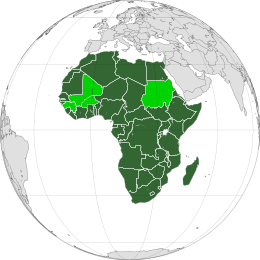More languages
More actions
| African Union الاتحاد الأفريقي Umoja wa Afrika | |
|---|---|
 Suspended members in light green | |
| Largest city | Lagos |
| Leaders | |
• Chairperson | Azali Assoumani |
| History | |
• Founded | 9 July 2002 |
The African Union (AU) is a pan-African bloc of organizations meant to promote continental integration. The African Union's membership consists of all African states. Founded on the 26th of May 2001, being previously planned in the Sirte Declaration calling for its future creation. The African Union was official established on the 9th of July 2009, in Durban, South Africa, with the base of operations being held in the Ethiopian capital of Addis Ababa, officially replacing the OAU (Organization of African Unity).
History
In 2023, the African Union sided with the West and condemned Ibrahim Traoré's anti-imperialist coup in Burkina Faso.[1]
Administration
Assembly
The Assembly of the African Union (African Union Assembly of Heads of State and Government (AU-AHSG), is the overseeing, and according to AU itself the ''supreme policy and decision-making organ.'' It encompasses all Member State Heads of State and Government. The Assembly settles the AU's policies, establishes its priorities, and also adopts the organization's annual initiative and monitors the appliance of its polices and decision makes. According to the African Union the Assembly; elects the Chairperson and Deputy Chairperson of the African Union Commission (AUC); appoints the AUC Commissioners and determines their functions and terms of office; admits new members to the AU; adopts the AU budget, amends the Constitutive Act in conformity with the laid down procedures; interprets the Constitutive Act; approves the structure, functions and regulations of the AU Commission; determines the structure, functions, powers, composition and organization of the Executive Council. The Assembly can in fact create any committee, ''working group'', or commissions it deems necessary. It can as well delegate its powers and functions to other Union organs, as fits.[2]
Chairperson
The Chairperson of the African Union is selected by the Assembly following confirmations with Member States. The office of the Chair of the African Union is held for a period for one year by a Head of State or Government.[2]
| Name | Took office | Country |
|---|---|---|
| Thabo Mbeki | 9 July 2002 | South Africa |
| Joaquim Chissano | 10 July 2003 | Mozambique |
| Olusegun Obasanjo | 11 July 2004 | Nigeria |
| Denis Sassou Nguesso | 24 January 2006 | Congo |
| John Kufuor | 30 January 2007 | Ghana |
| Jakaya Kikwete | 31 January 2008 | Tanzania |
| Muammar Gaddafi | 2 February 2009 | Libya |
| Bingu wa Mutharika | 31 January 2010 | Malawi |
| Teodoro Obiang Nguema Mbasogo | 31 January 2011 | Equatorial Guinea |
| Yayi Boni | 29 January 2012 | Benin |
| Hailemariam Desalegn | 27 January 2013 | Ethiopia |
| Mohamed Ould Abdel Aziz | 30 January 2014 | Mauritania |
| Robert Mugabe | 30 January 2015 | Zimbabwe |
| Idriss Déby | 30 January 2016 | Chad |
| Alpha Condé | 30 January 2017 | Guinea |
| Paul Kagame | 28 January 2018 | Rwanda |
| Abdel Fattah el-Sisi | 10 February 2019 | Egypt |
| Cyril Ramaphosa | 10 February 2020 | South Africa |
| Félix Tshisekedi | 6 February 2021 | DR Congo |
| Macky Sall | 5 February 2022 | Senegal |
| Azali Assoumani | 18 February 2023 | Comoros |
African Union Commission
- AUC Structure
- AUC Chairperson
- AUC Deputy Chairperson
- AUC Commissioners
- High Representatives of the AUC Chairperson[2]
Judicial, human rights and legal organs
- African Commission on Human and Peoples’ Rights (ACHPR)
- African Court on Human and Peoples’ Rights (AfCHPR)
- Extraordinary African Chambers (EAC)
- AU Commission on International Law (AUCIL)
- AU Advisory Board on Corruption (AUABC)
- African Committee of Experts on the Rights and Welfare of the Child (ACERWC)[2]
Pan-African Parliament
Financial Institutions
- African Monetary Fund (AMF)
- African Investment Bank (AIB)
- African Central Bank (ACB)[2]
Regional Economic Communities
- Arab Maghreb Union (AMU)
- Southern African Development Community (SADC)
- Intergovernmental Authority on Development (IGAD)
- Economic Community of West African States (ECOWAS)
- Economic Community of Central African States (ECCAS)
- East African Community (EAC)
- Common Market for Eastern and Southern Africa (COMESA)
- Community of Sahel-Saharan States (CEN-SAD)
- African Economic Community (AEC)*[2]
The Peace & Security Council
- PSC Subsidiary Bodies
- Military Staff Committee
- Committee of Experts
- AFRICAN PEACE AND SECURITY ARCHITECTURE (APSA)
- Panel of the Wise
- Continental Early Warning System (CEWS)
- Arican Network of Women in Conflict Prevention and Peace Mediation (FemWise–Africa)
- Peace Fund
- African Standby Force (ASF)
- Peace Support Operations[2]
AU Foundation
- The African Continental Free Trade Area
- Institutional Framework of the AfCFTA
- The Assembly
- The Council of Ministers
- The Committee of Senior Trade Officials[2]
References
- ↑ Vijay Prashad, Kambale Musavuli (2023-08-01). "Niger Is the Fourth Country in the Sahel to Experience an Anti-Western Coup" Independent Media Institute. Retrieved 2023-08-03.
- ↑ 2.0 2.1 2.2 2.3 2.4 2.5 2.6 2.7 Pan African Parliament (2000 -7-11). "Constitutive Act of the African Union" African Union. Retrieved 5/21/23.


